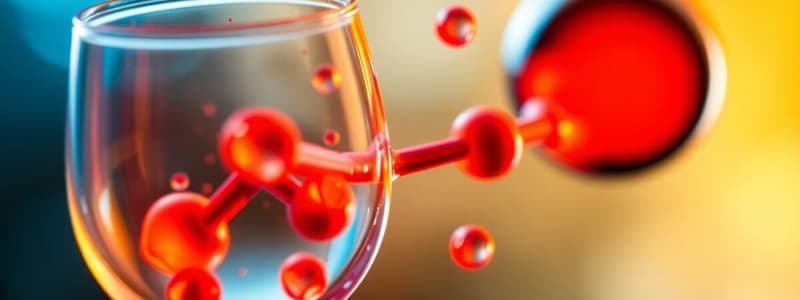Podcast
Questions and Answers
What is the correct definition of oxidation in redox reactions?
What is the correct definition of oxidation in redox reactions?
- Gaining electrons by an atom, ion, or molecule
- Losing protons by an atom, ion, or molecule
- Gaining neutrons by an atom, ion, or molecule
- Losing electrons by an atom, ion, or molecule (correct)
In the reaction of sodium and chlorine, which statement correctly describes sodium's role?
In the reaction of sodium and chlorine, which statement correctly describes sodium's role?
- Sodium is reduced because it gains electrons
- Sodium acts as an oxidizing agent in the reaction
- Sodium is oxidized because it loses electrons (correct)
- Sodium has no role in the redox reaction
What is the substance called that gains electrons during a redox reaction?
What is the substance called that gains electrons during a redox reaction?
- Oxidizing agent (correct)
- Reducing agent
- Catalyst
- Electrolyte
In the reaction 2H2 + O2 → 2H2O, what happens to the oxidation state of hydrogen?
In the reaction 2H2 + O2 → 2H2O, what happens to the oxidation state of hydrogen?
What does the acronym OIL RIG help to remember in the context of redox reactions?
What does the acronym OIL RIG help to remember in the context of redox reactions?
In the reaction Zn + CuSO4 → ZnSO4 + Cu, what is the change in oxidation state for zinc?
In the reaction Zn + CuSO4 → ZnSO4 + Cu, what is the change in oxidation state for zinc?
Why are redox reactions crucial in biological processes?
Why are redox reactions crucial in biological processes?
What role does the oxidizing agent play in a redox reaction?
What role does the oxidizing agent play in a redox reaction?
What is the oxidation number of sulfur in H₂SO₄?
What is the oxidation number of sulfur in H₂SO₄?
What must be true about the sum of oxidation numbers in a polyatomic ion?
What must be true about the sum of oxidation numbers in a polyatomic ion?
What is the oxidation number of manganese in MnO₂?
What is the oxidation number of manganese in MnO₂?
Which element is oxidized in the given reaction: MnO₄⁻ + C₂O₄²⁻ → Mn²⁺ + CO₂?
Which element is oxidized in the given reaction: MnO₄⁻ + C₂O₄²⁻ → Mn²⁺ + CO₂?
How do you determine the oxidation number of an element within a neutral compound?
How do you determine the oxidation number of an element within a neutral compound?
What is the role of oxidation numbers in redox reactions?
What is the role of oxidation numbers in redox reactions?
What is the oxidation number of chlorine in NaCl?
What is the oxidation number of chlorine in NaCl?
Which step is performed first when balancing a redox equation using oxidation numbers?
Which step is performed first when balancing a redox equation using oxidation numbers?
In the reaction 2MnO₄⁻ + 16H⁺ + 5C₂O₄²⁻ → 2Mn²⁺ + 8H₂O + 10CO₂, what is the total charge on the reactant side?
In the reaction 2MnO₄⁻ + 16H⁺ + 5C₂O₄²⁻ → 2Mn²⁺ + 8H₂O + 10CO₂, what is the total charge on the reactant side?
What is the final balanced equation for the reaction involving MnO₄⁻ and C₂O₄²⁻?
What is the final balanced equation for the reaction involving MnO₄⁻ and C₂O₄²⁻?
In which situation is the oxidation number method particularly useful?
In which situation is the oxidation number method particularly useful?
What is the oxidation number of oxygen in most compounds?
What is the oxidation number of oxygen in most compounds?
What is the reduction half-reaction for Mn in the reaction with MnO₄⁻?
What is the reduction half-reaction for Mn in the reaction with MnO₄⁻?
What happens to the oxidation number of manganese as it is reduced in MnO₄⁻?
What happens to the oxidation number of manganese as it is reduced in MnO₄⁻?
In the reaction Fe + O$_2$ → Fe$_2$O$_3$, what type of process is occurring?
In the reaction Fe + O$_2$ → Fe$_2$O$_3$, what type of process is occurring?
Which substance acts as the oxidizing agent in the reaction 2H$_2$ + O$_2$ → 2H$_2$O?
Which substance acts as the oxidizing agent in the reaction 2H$_2$ + O$_2$ → 2H$_2$O?
What is the oxidation half-reaction for zinc in the reaction Zn + CuSO$_4$ → ZnSO$_4$ + Cu?
What is the oxidation half-reaction for zinc in the reaction Zn + CuSO$_4$ → ZnSO$_4$ + Cu?
Which of the following correctly describes a reducing agent?
Which of the following correctly describes a reducing agent?
How is an oxidation number defined?
How is an oxidation number defined?
In which scenario does oxygen have an oxidation number of -1?
In which scenario does oxygen have an oxidation number of -1?
What does a reduction half-reaction illustrate?
What does a reduction half-reaction illustrate?
What happens to the oxidation state of hydrogen in H$_2$ when it reacts with metals in hydrides?
What happens to the oxidation state of hydrogen in H$_2$ when it reacts with metals in hydrides?
Which is true regarding the overall redox reaction Zn + Cu$^{2+}$ → Zn$^{2+}$ + Cu?
Which is true regarding the overall redox reaction Zn + Cu$^{2+}$ → Zn$^{2+}$ + Cu?
What is the rule for the oxidation number of elements in their pure form?
What is the rule for the oxidation number of elements in their pure form?
What is expected of the sum of oxidation numbers in a neutral compound?
What is expected of the sum of oxidation numbers in a neutral compound?
Which of the following elements always has an oxidation number of -1?
Which of the following elements always has an oxidation number of -1?
Flashcards
Redox Reaction
Redox Reaction
A chemical reaction where atoms change their oxidation states. It involves loss and gain of electrons.
Oxidation
Oxidation
The process where an atom, ion, or molecule loses electrons. Its oxidation state increases.
Reduction
Reduction
The process where an atom, ion, or molecule gains electrons. Its oxidation state decreases.
Oxidizing Agent
Oxidizing Agent
Signup and view all the flashcards
Reducing Agent
Reducing Agent
Signup and view all the flashcards
Half-Reaction
Half-Reaction
Signup and view all the flashcards
Oxidation States
Oxidation States
Signup and view all the flashcards
Redox Reactions and Energy
Redox Reactions and Energy
Signup and view all the flashcards
Writing half-reactions
Writing half-reactions
Signup and view all the flashcards
Oxidation number
Oxidation number
Signup and view all the flashcards
Oxidation number rule 1
Oxidation number rule 1
Signup and view all the flashcards
Oxidation number rule 2
Oxidation number rule 2
Signup and view all the flashcards
Oxidation number rule 3
Oxidation number rule 3
Signup and view all the flashcards
Oxidation number rule 4
Oxidation number rule 4
Signup and view all the flashcards
Oxidation number rule 5
Oxidation number rule 5
Signup and view all the flashcards
Oxidation number rule 6
Oxidation number rule 6
Signup and view all the flashcards
Oxidation numbers in chemistry
Oxidation numbers in chemistry
Signup and view all the flashcards
Polyatomic Ion Rule
Polyatomic Ion Rule
Signup and view all the flashcards
Neutral Molecule Rule
Neutral Molecule Rule
Signup and view all the flashcards
Assigning Oxidation Numbers
Assigning Oxidation Numbers
Signup and view all the flashcards
Half-Reaction Diagram
Half-Reaction Diagram
Signup and view all the flashcards
Balancing Redox Reactions
Balancing Redox Reactions
Signup and view all the flashcards
Redox Reaction Analysis
Redox Reaction Analysis
Signup and view all the flashcards
Elemental Oxidation Number
Elemental Oxidation Number
Signup and view all the flashcards
Oxidation Number Range
Oxidation Number Range
Signup and view all the flashcards
Oxidation Number Importance
Oxidation Number Importance
Signup and view all the flashcards
Neutral Compound Rule
Neutral Compound Rule
Signup and view all the flashcards
Study Notes
Redox Reactions
- Redox reactions, or reduction-oxidation reactions, involve changes in oxidation states of elements
- Oxidation: Loss of electrons by an atom, ion, or molecule; an increase in oxidation state
- Reduction: Gain of electrons by an atom, ion, or molecule; a decrease in oxidation state
- OIL RIG: Oxidation Is Losing; Reduction Is Gaining
- Redox reactions occur simultaneously: one substance is oxidized (loses electrons), and another is reduced (gains electrons)
Oxidizing and Reducing Agents
- Oxidizing agent: Gains electrons, causes another substance to lose electrons (oxidize); gets reduced (acquires electrons)
- Reducing agent: Loses electrons, causes another substance to gain electrons (reduce); gets oxidized (loses electrons)
- Example: hydrogen-oxygen reaction: oxygen is the oxidizing agent; hydrogen is the reducing agent
How to Identify Redox Reactions:
- Write half-reactions
- Determine electron transfer
- Recognize changes in oxidation states
Oxidation States:
- Oxidation state: hypothetical charge an atom would have if all bonds were ionic
- Rules for assigning oxidation states:
- Pure elements have an oxidation state of zero
- Monoatomic ion's oxidation state equals its charge
- Oxygen usually has an oxidation state of -2 (except in peroxides, where it's -1, or bonded to fluorine)
- Hydrogen usually has an oxidation state of +1 (except in hydrides, where it's -1)
- Fluorine always has an oxidation state of -1
- The sum of oxidation states in a neutral compound is zero; in a polyatomic ion, it equals the ion's charge
Half-Reactions
- Half-reaction: an equation representing either oxidation or reduction in a redox reaction.
- Oxidation half-reaction: Shows the loss of electrons (substance gets oxidized)
- Reduction half-reaction: Shows the gain of electrons (substance gets reduced)
- Example: Zinc-Copper Sulfate reaction:
- Oxidation half-reaction: Zn(s) → Zn²⁺(aq) + 2e⁻
- Reduction half-reaction: Cu²⁺(aq) + 2e⁻ → Cu(s)
Balancing Redox Reactions (Oxidation Number Method)
- Steps:
- Write the unbalanced reaction
- Assign oxidation states to all atoms
- Identify oxidation and reduction half-reactions
- Write the half-reactions, ensuring they are balanced for mass and charge
- Multiply half-reactions to have equal numbers of electrons gained/lost
- Combine the half-reactions to obtain the balanced equation
- Example: MnO₄⁻ + C₂O₄²⁻ → Mn²⁺+ CO₂ (balanced equation shown earlier)
Importance of Redox Reactions:
- Energy production (e.g., cellular respiration)
- Corrosion (e.g., rusting of iron)
- Batteries (e.g., electrochemical reactions in batteries)
Studying That Suits You
Use AI to generate personalized quizzes and flashcards to suit your learning preferences.



